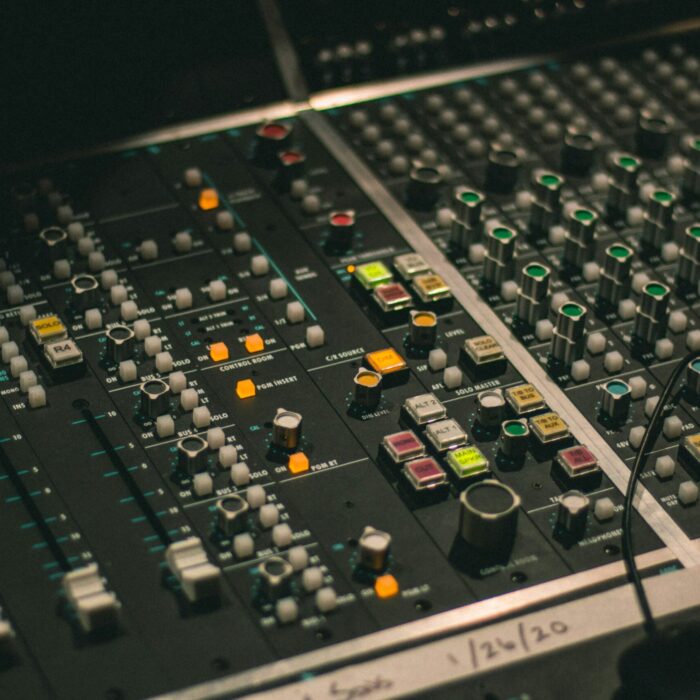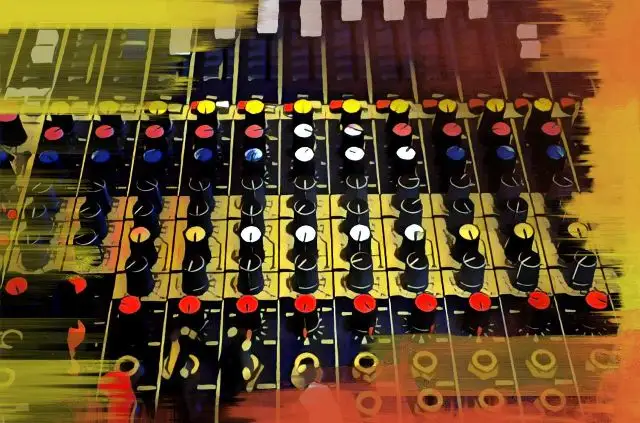What does it mean when music is remastered?Remastering is the process of improving the quality of a song, EP, or album by applying new mastering processing to it. This process can involve using standard mastering tools like compression, EQ, and limiting, as well as specialized restoration tools like RX. The goal of remastering is to remove flaws, provide a cleaner listening experience, and keep up with the latest audio formats. Remastering is often done to repackage classic albums for new generations of fans.
https://en.wikipedia.org/wiki/Remaster Remastering music improves the quality of the original copy of a song or album.
Remastering music improves the quality of the original copy of a song or album.The process aims to remove flaws from the music, to provide a cleaner, sharper, and more refined listening experience in line with modern audio standards.
https://mixbutton.com/mastering-articles/what-does-it-mean-when-music-is-remastered/How is remastering achieved?Remastering is completed by an audio engineer through the use of precise editing and processing units like equalization, stereo imaging, compression, and limiting.
To start the remastering process, a mastering engineer will get copies of the track or album and using a digital audio workstation (DAW), will listen to it to make necessary adjustments;
Frequency flaws are monitored using an equalizer unit throughout the runtime and balanced to ensure no spikes appear across a range of output devices.
Noise reduction techniques are executed to eliminate or subdue sounds such as hisses, hums, clicks, dropouts, bad edits, or whistling.
Compressing and peak limiting are then used for loudness and to enrich the overall impact of the audio.
Each of the stages above is executed with the highest grade of processing unit, to ensure the final output reaches the best sound possible.
Let's talk about Remastering - what is it and do we need it?
Mastering an Album VS Mastering a Song
Klayton aka Celldweller - Studio Sessions - Remastering Twenty Year Old Tracks
Remastering Songs: What It Means & How to Do Ithttps://emastered.com/blog/what-does-remastered-mean-in-songs
The music industry has changed rapidly over the past several decades, coinciding with the development of new and improved audio technology. That being said, some of the most classic music recordings are littered with technical limitations-- for instance, plenty of old songs are in mono vs. stereo.
Fortunately, record companies and musicians alike have the option to remaster music. Remastering a song or album can bring improved clarity to older songs, and provides opportunities for discovery by new listeners. But what exactly does remastered mean?
Below, we'll detail exactly what goes into the process of remastering the final mix of a track. We'll also share some concrete examples so you can listen to the power of remastered records for yourself.
A music remaster involves enhancing the original mix through a new mastering process to update the track based on the current listening standards. Original master tapes can be enhanced by utilizing noise reduction, equalization, compression, and other methods to restore the audio and output it for new modern formats.
To understand the power of a new master, lets take a listen to the classic Blackbird by The Beatles.
First, let's take a listen to the original recording of the iconic track:
Next, let's listen to the 2018 remaster of the same song:
The composition of the original record has not changed. However, the overall sound of the updated mix has arguably more presence based on the stereo playback standards of today. Remastering songs brings older tracks to new generations and enhances sound quality for all listeners to enjoy.
The term "remaster" refers to recommitting the mastering process. Proper audio mastering ensures that your music can be enjoyed across any playback medium and is the final step of the music production pipeline before a recording is passed onto distribution.
Do you have a final mix on your hands? Consider using Emastered's online audio mastering services to take your sounds to new heights. Our mastering engine is made by Grammy-winning engineers to ensure that your single, EP, or album is heard in the best light possible.
In a nutshell, remastering involves taking source audio (typically, an original mix) add moving through several auditory processes before exporting for consumption on modern outlets like streaming services and stereo playback devices. Some of the processing that occurs during the remastering process includes removing unwanted noise, shaping frequencies and transients, optimizing or compressing dynamic range, and potentially experimenting with more drastic effects like panning.
A remix colloquially refers to a mixing engineer or music producer taking all of the individual tracks of a song and putting them into an entirely new sonic context. Remixes do not necessarily intend to retain much of the original character of a track-- for instance, tracks might be resampled or cut out entirely to fit the needs of the producer, artist or DJ.
A remastered generally refers to a song being updated to today's audio quality standards. The result is an enhanced track, that still rings true to most of the sonic character of the original recording. In some cases, a remaster may include rebalancing the mix to achieve the best sound in the master. However, the term "remaster" itself strictly refers to taking a single final mix and mastering it again for modern consumption.
How to Remaster: A General Overview
As with traditional audio mastering, the remastering process will vary from one audio engineer to the next. Here are some steps you can generally expect to occur throughout the mastering process:
Start With High-Quality Source Material
A great remaster starts with the right source files. Some remastered albums may include creating an entirely new mix of all of the audio tracks in a mix, while others might equate to a true remaster, where the final original mix is remastered. In any case, its essential to track down the original mixes or individual tracks. Otherwise, remastering the audio simply won't be possible.
Clean the Audio First
All auditory processes are additive, meaning that your prior processes affect future processing decisions. Therefore, it's essential to work through any subtractive or reductive audio processing first. This could be deemphasizing any harsh frequencies, removing unwanted background noise or distortion. Start with a clean foundation and build on top of it.
Consider Any Mixing Changes
In the case that you're mixing the song again rather than just mastering previous records with a different balance, take care to consider methods that might not have been available with the previous mix. For instance, stereo or even surround sound panning might be worth considering with the modern tools at your disposal. The balance of the mix can drastically change the overall character of a song, so tread lightly. Keep your original master nearby to A/B test with your new mix for reference.
Master the Mix
Once you have your new mix bounced or taken out any unwanted sound from the original master, it's time to officially remaster! This process often includes compressing, limiting, and slightly adjusting the master track in accordance with modern output standards. You can also create digital masters using Emastered's powerful engine .
Export Deliverables
The original tapes and mixes of several decades ago likely weren't optimized for modern streaming services or stereo hi-fi audio. Remastering gives engineers the opportunity to deliver music to these platforms properly, preserving and updating sonic quality for listeners new and old alike.
Remastering Process FAQ
Restoring an original recording ensures that timeless music will stand up to the audio quality standards of today. Here are some additional commonly asked questions and answers to help you excel on your digital remastering journey:
What happens when a song is remastered?
When a song is digitally remastered, the sound quality is updated by a mastering engineer for more clarity and enhancement by today's listening standards. For instance, the master recording might be altered with noise reduction, frequency enhancement, and optimized for speakers or playback systems that weren't necessarily a consideration surrounding the original recording.
Why do artists remaster their music?
Remastering music can bring a classic recording up to the standards of today's listening landscape. The new release also provides opportunity for the master tapes to be enjoyed once again by old fans and potentially discovered by new listeners.
Are remastered songs louder?
Remastered versions of songs are not necessarily louder or quieter than the original recording. Mastering engineers align their focus with the output standards of today, though the sonic perspective and quality will vary based on an audio professional's perspective.
What is the meaning of remastered version?
A remastered version of song is taking the original music and updating its master mix according to modern standards. Its not a remake of a song, rather you can think of it as an update to the original release to account for advances in new technology and audio quality standards of today.
Do remasters sound better?
While some might prefer the digitally remastered version of a song, others may enjoy the character of the original master tapes. This answer is largely subjective, but an update of the original mastering can introduce new clarity and higher resolution which may make for a more modern listening experience.
Digital remastering can create a refined listening experience for die-hard and new fans alike. A remastering engineer ensures that even the most classic albums on vinyl records or even analog tape can be enjoyed and experienced for generations to come.
 Total Posts: 12614
Total Posts: 12614 Total Topics: 5009
Total Topics: 5009 Online Today: 243
Online Today: 243 Online Ever: 816
Online Ever: 816 Total Posts: 12614
Total Posts: 12614 Total Topics: 5009
Total Topics: 5009 Online Today: 243
Online Today: 243 Online Ever: 816
Online Ever: 816